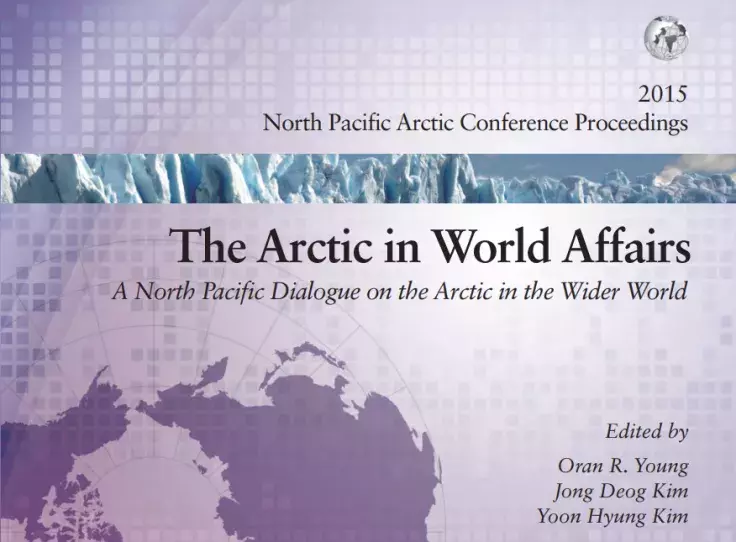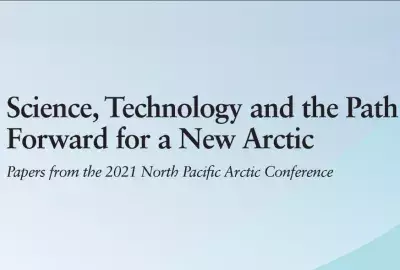Error message

The Arctic in World Affairs: A North Pacific Dialogue on the Arctic in the Wider World addresses six major themes: the U.S. Arctic Council chairmanship program; policy implications of climate change for the nations with Arctic interests; implementation of the polar code; the impacts of shifting world energy markets on Arctic resource development; stewardship of the Arctic Ocean, and healthy communities in the Arctic. Bringing together the contributions of experts from the three North Pacific Arctic coastal states (Canada, Russia, and the United States) and three leading North Pacific non-Arctic states (China, Japan, and Korea), the book goes beyond generalities to identify and evaluate the effectiveness of innovative measures that will contribute to maintaining the Arctic as a zone of peace and promoting sustainable development in the region. On the U.S. Arctic Council chairmanship program, the book outlines steps already taken by the U.S. as well as plans for continuing progress. It introduces key thematic areas: healthy Arctic communities, Arctic climate change, and Arctic Ocean stewardship. On policy implications of climate change for nations with Arctic interests, the book explores both negative and positive impacts on the livelihoods of northern peoples, some recent developments in the science of climate change, and the policy implications for the nations with Arctic interests. On implementation of the polar code, the book discusses (i) issues of compliance and enforcement, (ii) complications relating to the effort to develop uniform standards, (iii) questions pertaining to cooperation and coordination among states and non-state actors responsible for implementation, and (iv) an overall assessment regarding the effectiveness of the code. On the impacts of shifting world energy markets on Arctic resource development, the book focuses on (i) dramatic changes in international oil and gas markets, (ii) Russian-Chinese energy relations, (iii) the implications of lifting sanctions on Iran, and (iv) Russia's perception of Arctic energy projects. On stewardship of the Arctic Ocean, the book examines (i) control of pollution in and into the Arctic, (ii) protection of ecologically or culturally significant areas, and (iii) future directions for international cooperation in protecting the Arctic marine environment. On healthy communities in the Arctic, the book considers major issues facing Arctic communities, explores the nature of adaptations to change occurring in these communities, discusses areas where outsiders may be able to make useful contributions to the quality of life in Arctic communities, and identifies success stories that may be relevant to those facing similar challenges in other parts of the world. The book seeks to fill gaps in knowledge regarding the Arctic, identifying remaining uncertainties and developing policy innovations that can promote peaceful and sustainable uses of Arctic resources in the future. |
|
The Arctic in World Affairs: A North Pacific Dialogue on the Arctic in the Wider World addresses six major themes: the U.S. Arctic Council chairmanship program; policy implications of climate change for the nations with Arctic interests; implementation of the polar code; the impacts of shifting world energy markets on Arctic resource development; stewardship of the Arctic Ocean, and healthy communities in the Arctic. Bringing together the contributions of experts from the three North Pacific Arctic coastal states (Canada, Russia, and the United States) and three leading North Pacific non-Arctic states (China, Japan, and Korea), the book goes beyond generalities to identify and evaluate the effectiveness of innovative measures that will contribute to maintaining the Arctic as a zone of peace and promoting sustainable development in the region. On the U.S. Arctic Council chairmanship program, the book outlines steps already taken by the U.S. as well as plans for continuing progress. It introduces key thematic areas: healthy Arctic communities, Arctic climate change, and Arctic Ocean stewardship. On policy implications of climate change for nations with Arctic interests, the book explores both negative and positive impacts on the livelihoods of northern peoples, some recent developments in the science of climate change, and the policy implications for the nations with Arctic interests. On implementation of the polar code, the book discusses (i) issues of compliance and enforcement, (ii) complications relating to the effort to develop uniform standards, (iii) questions pertaining to cooperation and coordination among states and non-state actors responsible for implementation, and (iv) an overall assessment regarding the effectiveness of the code. On the impacts of shifting world energy markets on Arctic resource development, the book focuses on (i) dramatic changes in international oil and gas markets, (ii) Russian-Chinese energy relations, (iii) the implications of lifting sanctions on Iran, and (iv) Russia's perception of Arctic energy projects. On stewardship of the Arctic Ocean, the book examines (i) control of pollution in and into the Arctic, (ii) protection of ecologically or culturally significant areas, and (iii) future directions for international cooperation in protecting the Arctic marine environment. On healthy communities in the Arctic, the book considers major issues facing Arctic communities, explores the nature of adaptations to change occurring in these communities, discusses areas where outsiders may be able to make useful contributions to the quality of life in Arctic communities, and identifies success stories that may be relevant to those facing similar challenges in other parts of the world. The book seeks to fill gaps in knowledge regarding the Arctic, identifying remaining uncertainties and developing policy innovations that can promote peaceful and sustainable uses of Arctic resources in the future. |
|







